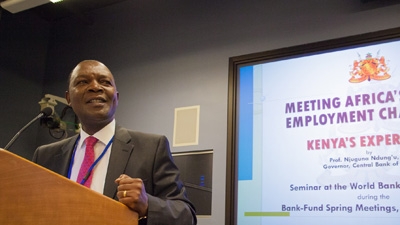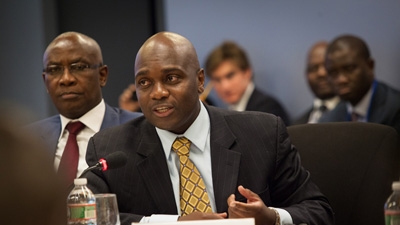WASHINGTON, April 11, 2014—Every year for about the next 20 years, there will be half a million more 15-year-olds in Sub-Saharan Africa than the year before. While the rest of the world ages, Africa’s youthful population could be a huge economic asset for the continent.
Yet, for young people working on a family farm or in a small household enterprise, the challenges are daunting. On the one hand, access to land, capital, finance, technology and markets is limited. On the other, weak education and skills are holding young people back.
To reap a demographic dividend as the number of working age people outnumber the number of dependents, African governments will need to invest in children and youth today, as well as carry out wide-ranging reforms that improve the business climate and increase productivity.
Informal is normal: Boost productivity in Africa’s huge informal sector
“The main problem in Africa is not unemployment, it is underemployment, said Makhtar Diop, World Bank Vice President for Africa. “Young people in Africa cannot afford to stay at home. Many sell things on the street or wash cars in the city to make a living, and they are unable to find work for more than a few hours a day. The question is, how can policies target this group?”
Diop was opening an event on “Meeting Africa’s Youth Employment Challenge” during the World Bank-IMF Spring Meetings in Washington DC, at which findings from the first comprehensive report on this subject were discussed with delegates from African countries.
A central message of the report is that the informal sector, historically neglected in most African countries, deserves much more attention from policymakers. Even as modern wage jobs multiply, the informal sector will remain Africa’s biggest “employer” in the near future.
According to Deon Filmer, a World Bank lead economist and co-author of Youth Employment in Sub-Saharan Africa, agriculture is critical as many youth will continue to work in this sector. Also, demand for food from African farms is growing in both domestic and export markets.
“Governments can take action right away to make land markets operate more fluidly, provide demand-driven extension services, and increase financial inclusion,” Filmer said.
Louise Fox, a former lead economist at the World Bank and now a visiting professor at the University of California, Berkeley, pointed out that young people do not perceive agriculture favorably now because they are not really able to earn well and prefer to try to move out.
Describing the situation in his country, Hon. Njuguna S. Ndung'u, Governor, Central Bank of Kenya, explained that for years, the perception was that the informal sector was driving growth. However, a closer look revealed that while the number of informal sector units was increasing, existing units were not expanding. “So it was not absorbing labor, there was hidden unemployment in there, and actual productivity was not rising,” the Governor said.
Solutions to the youth employment challenge must cut across many sectors, and most importantly, interventions should be sustainable, he concluded.



